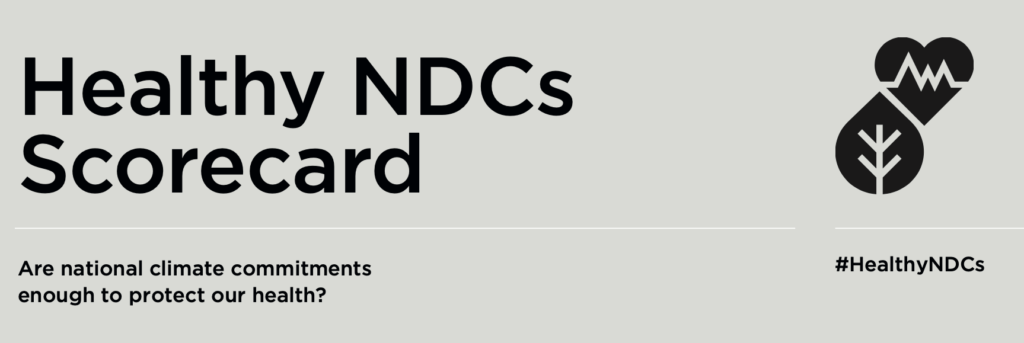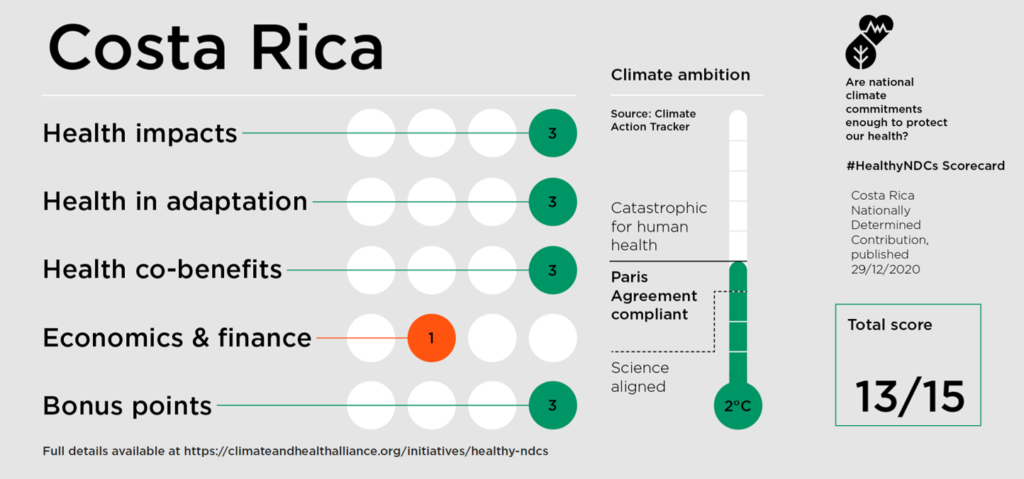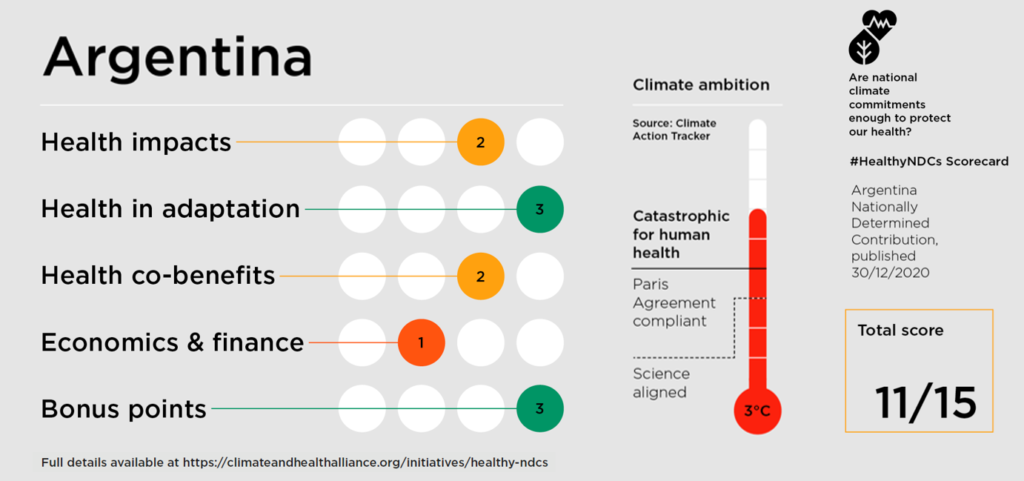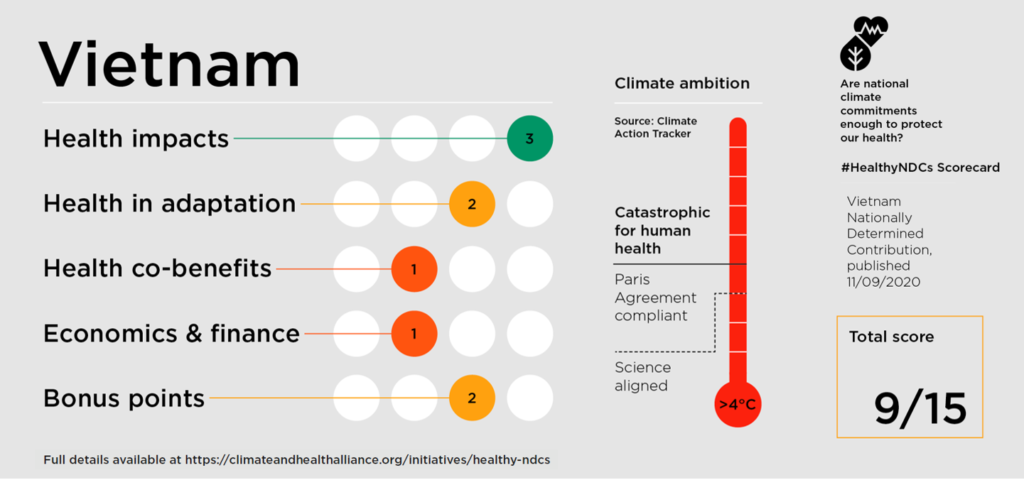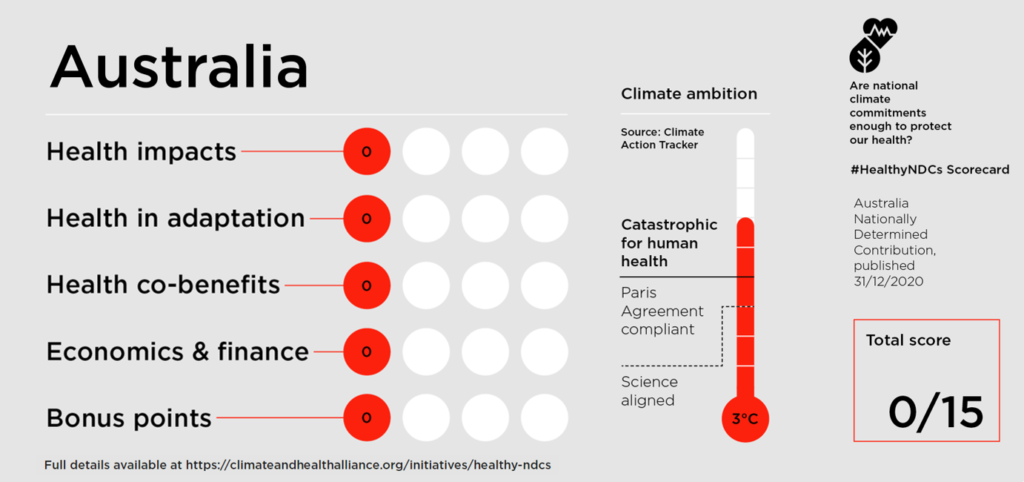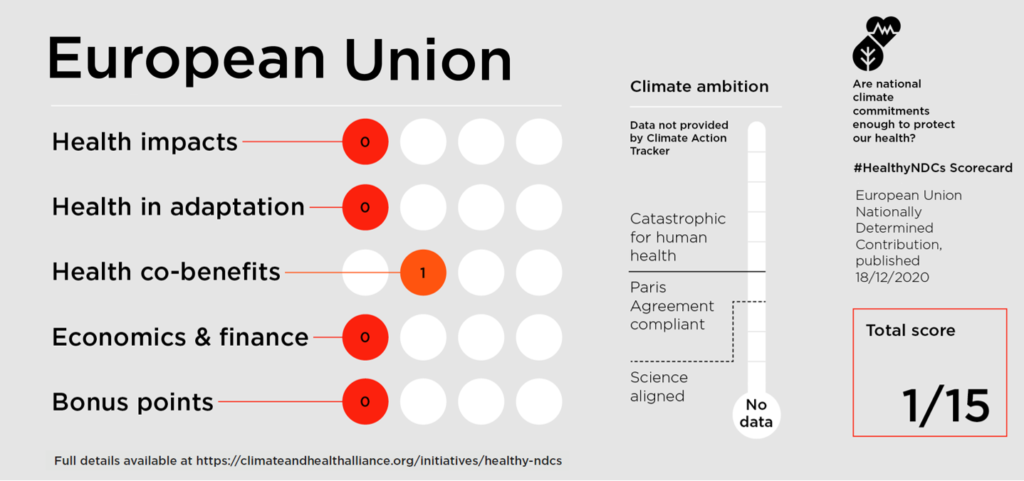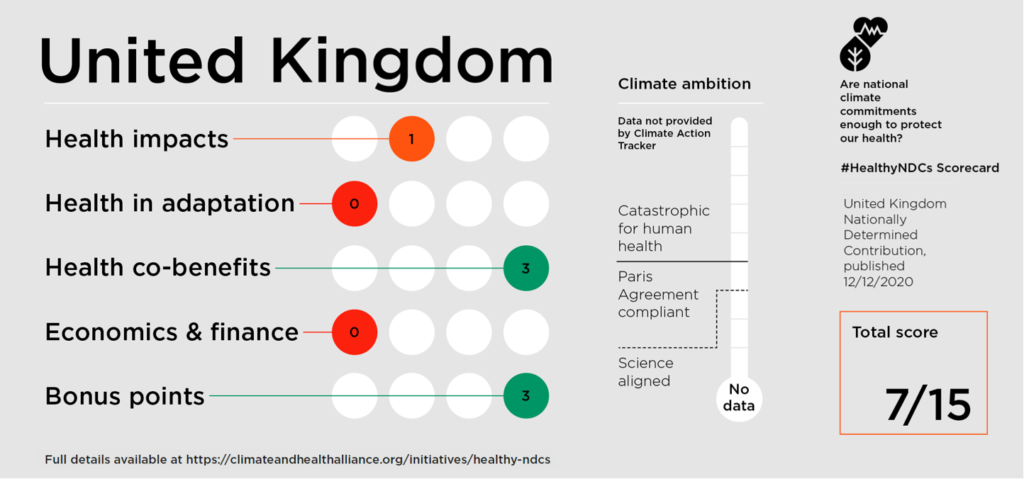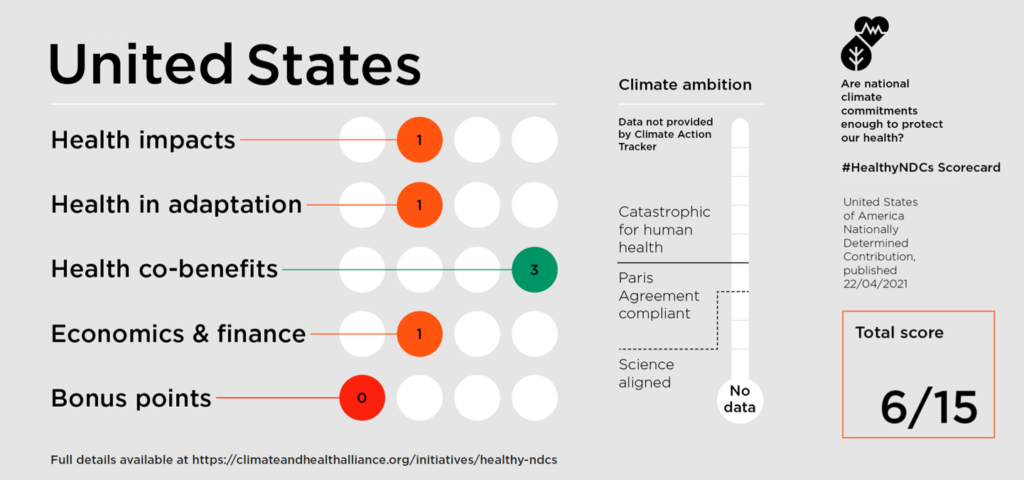- Update: September 21, 2021 – New Round of Scorecards added
- The Healthy NDCs Scorecard can be downloaded from here
- Watch press briefings here (inc presentation PPT) or here on YouTube
- See Statement from Costa Rica environment minister below
- For more details contact Dave Walsh, Communications Advisor, Global Climate and Health Alliance, +34 691 826 764 (Europe) [email protected]
Global, July 8, 2021:- Despite spending over a year dealing with the pandemic, along with heatwaves, forest fires and other climate impacts, governments are not yet doing enough to prioritise health in the face of a warming climate or to incorporate health into their climate commitments, according to the Healthy NDCs Scorecard released today by the Global Climate and Health Alliance [1].
The “Healthy NDC Scorecard”, which ranks progress of countries towards the inclusion of health within national climate commitments (Nationally Determined Contributions – NDCs), ahead of COP26, finds a wide spectrum of scores achieved by both low- and middle-income countries (LMICs) and high income countries (HICs) [2]. Costa Rica scored 13 out of a possible 15 points, followed by Laos and Senegal (12 points) and Argentina, Lebanon, Papua New Guinea and Rwanda (11).
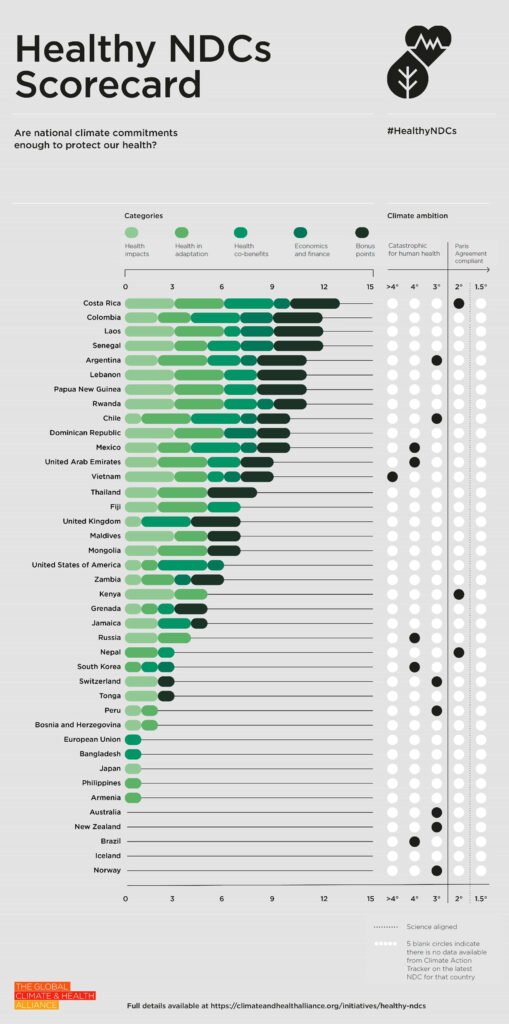
“With countries making up around 50% of global emissions yet to publicly update their national climate commitments ahead of COP26, there is a massive opportunity for governments to build in ambitious emissions reductions targets, reap the health benefits of well-considered climate action, and to bolster their economies”, said Jeni Miller, Global Climate and Health Alliance Executive Director [3]. “With heatwaves and wildfires already having serious impacts on health, any alternative is to risk endangering both people and the planet on which we all depend”, she added.
Several high income countries such as Australia, New Zealand, Iceland and Norway scored zero points, while the EU, representing 27 member states, registered just one point. It was somewhat better news for the US, which scored six, while the UK achieved seven out of a possible fifteen.
Where data was available, the scorecard also highlights whether countries’ emissions reductions commitment is on track to meet the goal of the Paris Agreement to limit global temperature rise to well below 2C, and ideally 1.5C.
Some countries, while scoring high for inclusion of health in their NDCs, are lacking in climate ambition overall. Argentina, for instance, has aligned its plans with 3C degrees of warming, which would have severe implications for human health. For the NDCs featured in this round of the scorecard, only three countries (Costa Rica, Kenya and Nepal) are aligned with 2C, and none were aligned with 1.5C [4].
“Making climate commitments that limit the earth to 1.5C of warming – in line with the Paris Agreement is crucial to the protection of health”, said Miller. “Although some countries have incorporated health into their climate commitments – making clear links between climate and health – many fall short of their fair share of emissions reductions – overall, international climate ambition still remains far below what is needed to protect health”.
“Paying lip-service to health has little effect unless concerted efforts are also made to reduce greenhouse gas emissions, as this will be the largest factor in defining the health of future generations. Failure to do so will be catastrophic for human health”, concluded Miller.
While many of the 40 NDCs analyzed for the scorecard, representing 66 countries (including the EU 27) have included health in their Nationally Determined Contributions (NDCs), few provide more than superficial detail on how they will protect their citizens’ health from the impacts of climate change, while even fewer consider how this could be financed, or the costs of failure to act.
“Governments that have omitted health from their Nationally Determined Contributions (NDCs) or whose emissions targets are inadequate must act to put the protection of their citizens’ health front and centre of their national climate policies, or risk disaster”, said Jess Beagley, Policy Analyst to the Global Climate and Health Alliance. “Countries that have yet to submit their NDCs must include substantive plans for dealing with the health impacts of climate change, and that includes how these measures will be financed. Time, resources and cash need to be invested now into health, to protect against severe health impacts due to environmental damage”, she added.
“What the Healthy NDC Scorecard shows is that overall, countries are far from where they need to be in terms of incorporating health into climate policy”, continued Beagley. “However, the highest-scoring countries offer ready examples that this can be done, and should inspire the rest to follow suit, so that they can reap the health benefits for their people.”
Key Findings:
- Of the 66 countries – including the EU 27 – included in the scorecard, all but five included health in their national climate commitments ahead of COP26
- Some of the highest scoring countries were LMIC (low- and middle-income countries) such as Costa Rica (13/15) – which received full marks for all categories except finance and economics. Costa Rica’s climate ambition is also in line with the Paris Agreement. Other high scoring countries were a mix of low and middle income countries – such as Senegal, Laos, Rwanda, Papua New Guinea, Lebanon and Argentina. This could be due to the health impacts of climate change already taking place in these countries.
- However, relatively high scores for inclusion of health are often not matched by levels of ambition sufficient to deliver on the Paris Agreement, presenting a catastrophic threat to health. e.g. United Arab Emirates, Vietnam, Mexico, Argentina, Chile. Unless emissions are dramatically reduced, the level of warming by the end of the century will be catastrophic for human health.
- Some countries (including some typically considered progressive on other issues) not only failed to include attention to health, but demonstrated insufficient levels of overall climate ambition – such as Australia, New Zealand, Brazil, Norway.
- High Income countries (HICs) typically scored lower, with Australia, New Zealand, Iceland, Norway all receiving zero points. The EU’s NDC, which covers all of its 27-member states, achieved just one point out of a possible 15, for recognition of health co-benefits. Note that HICs often have separate strategies with a strong focus on adaptation measures for health (such as COP26 host the UK, which scored 7/15). However only NDCs themselves were analysed for this work, and not other related policies.
- The United Kingdom and the USA both scored full marks for consideration of health co-benefits, while the UK also provided detail on policies which already existed to support these objectives.
- Governments must consider budgetary requirements and potential savings in the delivery of health commitments. Many countries, including Australia, Brazil, New Zealand, Norway, Switzerland, Thailand, UK, United Arab Emirates and the EU 27, did not receive any points for recognizing the costs of health impacts, referring to savings from health co-benefits, or allocating budget to adapt their health systems. Aspirations relating to health adaptation are well and good, but remain aspirational without budget to support actions. Health is worth investing in – at the end of the day there can be no economy without health.
- International financing from wealthier, more industrialized countries is also necessary to support countries most vulnerable to the health impacts of climate change, and which recognise health impacts of climate change in their NDC, so that they can deliver their ambitious and health focussed plans. Low-income and lower-middle income countries Laos, Rwanda, Papua New Guinea and Senegal presented health considerations and actions throughout their NDCs, but will require international funding, such as that promised from sources like the Green Climate Fund, to deliver fully on those commitments.
Statements:
“Costa Rica recognizes that climate change will impact people’s health and that we need to take urgent action. Fortunately, we have the tools to address this issue. The investments needed to tackle climate change will improve air quality, take pressure off our healthcare systems, and improve our well-being. The recognition of Costa Rica’s climate policies in this ranking shows once again that the country is a world leader in the fight against climate change and that these actions are within reach of countries of all sizes”, said Andrea Meza, Environment and Energy Minister of Costa Rica. Press contact: [email protected]
“This scorecard shows that Australia is again at the bottom of the pack when it comes to taking the health effects of climate change seriously. In May, over 60 health groups including the AMA and Hesta Super, called on Prime Minister Scott Morrison to prioritise health in Australia’s NDC commitment — this analysis from the Global Climate and Health Alliance confirms that our current commitment is not adequate to keep us safe and healthy”, said Fiona Armstrong, Executive Director, Climate and Health Alliance. “The Prime Minister must both act to reduce emissions, and prioritise health in our international climate commitments before COP26 to protect our health.” Press contact: [email protected]
“New Zealand’s zero rating is both damning and alarming. Within that is the unconscionable invisibility of human health to accelerate and fund fast climate action.This does not reflect who we are as a nation and must be lifted”, said Dr Dermot Coffey, Co-convenor OraTaiao: New Zealand Climate and Health Council. [email protected]
“Climate solutions are jam-packed with health benefits, from actions to cut greenhouse gas emissions that also improve air quality, to adoption of urban designs that promote fitness through safe bicycle and pedestrian travel,” according to Jonathan Patz, Professor and Director of the University of Wisconsin-Madison, Global Health Institute. “Protecting nature-based carbon sinks such as rainforests and large ecosystems can also prevent the emergence of infectious diseases, and more sustainable plant-based diets can save millions of lives each year. If world leaders scale up technologies already existing today, global temperatures can be stabilized by 2050 while human health benefits will accrue almost immediately,” adds Dr. Patz, member of the U.S. National Academy of Medicine. Contact: [email protected]
“Although scientific evidence shows that Europe is the region most vulnerable to the heat-related impacts of the climate emergency, the urgency has not quite registered yet with policy-makers, as seen in the unambitious updating of the EU’s 2030 emission reduction target from -40 to -55%. If the EU wants to show global leadership in keeping to 1.5 degrees, the upcoming Fit for 55 legislative package is the moment to step up, for swift decarbonisation and health protection”, said Anne Stauffer, Deputy Director, Health and Environment Alliance (HEAL). [email protected]
“ Climate inaction can exacerbate the health, social and economic impacts of the COVID-19 pandemic. Driving the formulation and uptake of healthy national climate commitments will have important implications for the post-COVID world,” said Poornima Prabhakaran, Deputy Director, Centre for Environmental Health at Public Health Foundation of India. [email protected]
“The UK has displayed leadership in setting an early NDC consistent with limiting global warming to 1.5℃. As recently highlighted in the CCC’s 2021 progress report this ambition needs to be backed by stronger action across a number of domains, to ensure the UK delivers its target emissions”, said Yannish Naik, Interim Director, UK Health Alliance on Climate Change. [email protected]
Note: More quotes available – here (inc Canada, Chile, New Zealand, South Africa)
Methodology
The first round of analysis ranked 40 NDCs available while the research was being carried out. Analysis for the subsequent NDCs will be published by GCHA in the coming weeks.
The scorecard covers 40 of the 65 NDCs submitted to date, covering 66 of the 91 countries which have submitted NDCs, including the EU 27.
Countries were assigned a score based on consideration of health in five key areas – impacts, adaptation, co-benefits, economics and finance, with additional bonus points available where there was particular focus on health, or consistent integration of it. Ambition for reduction of greenhouse gas emissions was also deemed essential, and was considered where data was available but not incorporated into country scores. The European Union submits a joint NDC and was thus analysed in the same way as NDCs from individual countries.
Countries received scores on the following basis:
- Countries were assigned a score for the extent to which health was included across health impacts, health in adaptation – i.e. strengthening health systems to cope with added burdens, health co-benefits, acknowledgement of economic and financial requirements, and bonus points for overall prominence of health, up to a total of 15 points.
- Climate ambition was also considered, since temperature rise will have the greatest bearing on health, but data (from Climate Action Tracker) was not available in all cases, and was not included in the score.
The Global Climate and Health Alliance is calling on governments to ensure that national climate action commitments include:
- Ambitious commitments for greenhouse gas emissions reductions, aligned with Paris Agreement target of 1.5C
- Measures to reduce greenhouse gas emissions that mitigate climate change and also maximise health co-benefits – such as by improving air quality, supporting walking, cycling and public transport use, and increasing access to healthy and sustainable diets.
- Calculation of the associated health costs savings, with health impact assessments that demonstrate these health and economic gains.
- Adaptation strategies which incorporate health and commit investments to build climate smart and resilient healthcare and public health systems.
- Within and beyond NDCs, Covid-19 recovery investments must align with healthy national climate action/commitments, to protect people, the planet and economies, securing a healthy and sustainable future
More information on healthy national climate commitments will be available here.
ENDS
Contacts:
Dave Walsh, Communications Advisor, Global Climate and Health Alliance, +34 691 826 764 (Europe) – [email protected] is checked constantly.
Notes:
Climate Home, Comment: Why health must be put at the heart of national climate plans
[1] Healthy NDC Scorecards https://climateandhealthalliance.org/initiatives/healthy-ndcs/
[2] United Nations Framework Convention on Climate Change: Nationally Determined Contributions (NDCs)
Nationally Determined Contributions (NDCs) are national commitments for climate change response, including policies and measures to achieve the global targets set out in the 2015 Paris Agreement. NDCs require regularly updating, with increasingly ambitious targets. The NDCs submitted in the lead up to COP26 will define the course of national climate action until updated NDCs submitted in 2025 come into force.
[3] “Climate Commitments Not On Track to Meet Paris Agreement Goals” as NDC Synthesis Report is Published
[4] Data for this aspect of the scorecards is from https://www.climatewatchdata.org/2020-ndc-tracker
This figure does not take into account the commitments of countries which had not been submitted at the time the report was drafted, which account for 70% of global emissions.
About the Global Climate and Health Alliance
The Global Climate and Health Alliance is the leading global convenor of health professional and health civil society organizations addressing climate change. We are a consortium of health organisations from around the world united by a shared vision of an equitable, sustainable future, in which the health impacts of climate change are minimized, and the health co-benefits of climate change mitigation are maximised.
Find out more: https://climateandhealthalliance.org/about/

